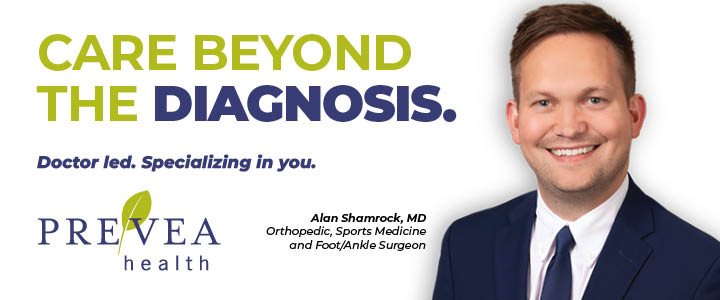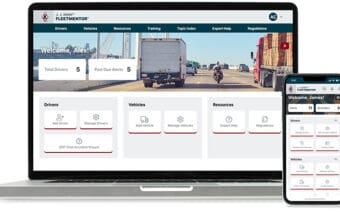
December 16, 2022
APPLETON – Igor Leykin, president of LIR Transportation and Fox Valley Cab, said as an immigrant it’s always been a desire of his to own a business.
“I always wanted something on my own – that’s been a goal of mine to run my own business,” he said. “In all honesty, I think many immigrants, that’s their goal – to be independent, be in control of their own life and obviously to live the American Dream and attain success. Owning a business maybe identifies you somehow.”
Leykin immigrated to the United States from Belarus – a landlocked country in Eastern Europe – with his mother and brother in 1976 when he was 10 years old.
He grew up and attended school in Mequon, later attending college in Milwaukee.
After graduating from Cardinal Stritch University, Leykin said he worked in software engineering for a handful of years before going to work for his brother’s company – A+ Mortgage Services, Inc. in Muskego.
During that time, Leykin said the desire to own his own business remained, but nothing “materialized” until the opportunity to purchase Fox Valley Cab presented itself.
He said everything “felt right.”
“That rarely happens, but everything just felt right,” he said. “We had a company that was well established. It was family owned since 1954, by good people. It had clean financials. It was decently organized for that time.”
Little did Leykin know, he’d have his work cut out for him.
Learning on the go
When he purchased Fox Valley Cab, Leykin said he didn’t have any experience in the industry, but felt his experience in managing companies and people would give him a strong foundation.
“The rest of it was just learning the process,” he said. “I also needed to learn the industry itself – everything from acquisition of resources, such as vehicles, building maintenance, mechanics and budgeting, so sort of get acquainted with how things run.”
Through that process, Leykin said he realized the company needed several updates.

Fox Valley Cab Owner Igor Leykin said after buying the business, he had to implement several modernized practices – including computers. Submitted Photo
“I acquired an aging company, what is termed a legacy taxi company,” he said. “Everything was done on paper and pencils. Everything was done with two-way radios. We also had an aging fleet.”
Leykin said the venture was a “much bigger learning curve” than he had expected.
“I got into owning a business a little bit later in my life, as far as a career, and I didn’t want to start something from scratch,” he said. “I thought buying an established company would be less of a learning curve – just kind of take over operations, learn around and see how you can modify stuff. But I knew we would have to modernize.”
When he purchased the company, Leykin said he acquired 24 vehicles, 35 employees, the building and a ton of paper.
“We literally had almost no computers,” he said. “Everything was done on paper and pencil. We had all the paper logs and paper trails. We had cabinets filled with all kinds of documents and papers.”
Leykin said he knew to be relevant in the ever-changing industry and achieve growth, he’d need to modernize.
Research and resources
Leykin said purchasing the largest taxicab company outside of Milwaukee and Madison, “there was not much I was going to learn about the industry in Appleton.”
“So, I joined a major taxi association and started attending their events and conventions,” he said. “I even took some of the key employees to the conventions, so they learned something about the taxi industry.”
Leykin said he was concerned with complacency.
“Because being the biggest fish in a small pond is not necessarily a good thing,” he said. “When people think of us, we had 24 cars and 35 people, and when we visited a company in Las Vegas that runs an almost 1,000-car fleet and has 2,000 drivers on the road – it kind of puts things in perspective of what this industry is like.”

Fox Valley Cab has a variety of vehicles in its fleet including mini vans, black car services and wheel-chair accessible vans. Submitted Photo
These realizations, Leykin said, are what precipitated all the changes they made at Fox Valley Cab.
He said it took about a year to begin implementing changes.
“It took me two years to implement basic spreadsheets so that people could stop balancing things on a calculator,” he said. “I did not realize how much of a culture change and how difficult it is to do. People are accustomed to doing something one way and getting people to change and to see things differently – it was a much bigger challenge than I thought.”
Eventually, Leykin said he invested in new dispatcher software and phone systems.
“We learned what we’re looking for and how to implement,” he said. “Having a telephone system, we created that is now integrated with the dispatching system was a game changer.”
Leykin said the company has an app, but it isn’t utilized much.
Though how Fox Valley Cab did things internally changed over the years, Leykin said its overall focus didn’t.
“We do our best to be a good corporate citizen and be a part of the community – that is where the company has been since the 1950s,” he said. “When I acquired the company, I made sure to retain the name because that’s what everybody knew.”
Things, Leykin said, seemed to be going strong – then came COVID-19.
The impacts of COVID-19
Leykin said when the pandemic hit, things were “rather scary” for a long time.
“At one point, 70% of our business dried up,” he said. “I mean, the Appleton School District was our big account (for special education student transportation services) – well, guess who wasn’t going to school?”
Leykin said Fox Valley Cab would typically do around 1,000 trips to and from the airport.
“Well, the (Outagamie County) Airport is not a major destination – it’s a business traveler airport, and that all but dried up,” he said. “We had a number of challenges at that time. We had no revenue, and we had debts to cover. We tried to keep people employed.”
After the initial shock of what was happening started to wear off, Leykin said the pandemic actually opened quite a few opportunities for the company – which included an uptick in medical transportation services.
“We realized people still had to get to their dialysis appointments,” he said. “In the beginning stages, we didn’t really know what COVID was, what the real threat was. We just knew we had to keep working. We still had to help people get to a hospital. We had to invest heavily in putting partitions into our vehicles and getting all the cleaning supplies – which were hard to get at one point.”
The pivots put in place because of COVID – many still in place – Leyvin said were about survival.
“Driving for us to keep operating was more for survival,” he said. “We weren’t going to be able to carry too much debt.”
However, Leykin said it also afforded Fox Valley Cab an opportunity to build relationships.
“We built trust and understanding,” he said. “We will provide a wheelchair – we bought wheelchairs. We will deal with discharges and hospitals. We will go up to a room and help people out. We provide more of a personalized niche service.”
Leykin said now, many agencies rely on Fox Valley Cab.
He said they realized pretty quickly that the shortage in medical transportation services was their growth opportunity.
Leykin said he believes his ability to be flexible, open to pivoting, realizing what markets are available and where there is a need is what got them through the pandemic and has contributed to its success since.
“I want to make sure our company is diversified, unlike in the past when it was dependent on one individual client (the Appleton School District),” he said.
As things began returning to normal, Leykin said the Appleton School District went in a different direction for its special education transportation needs, which in actuality turned out to be better in the long run.
“That actually worked out for the better because we were able to repurpose the vehicles to handle medical transports,” he said. “Now instead of a vehicle being used in the morning and in the afternoon, the vehicles run all day.”
Other opportunities
Leykin said there are still many other opportunities “in that arena.”
“One of the things different organizations are asking for is gurney service,” he said. “So, that is something we launched only a few months ago.”
Part of offering new services and branching out into different markets, Leykin said, is research.
“We had to learn what it all entails,” he said. “For instance – What kind of training and equipment do we need? Do I have the staff for that?”
In order to be successful in these sectors, Leykin said a major focus is put on training.

Owner Igor Leykin said all company drivers have gone through wheelchair training. Submitted Photo
“We’ve gone through very specific training,” he said. “That probably separates us from others – we invest a lot in training. We’ve hired consultants. We are going through a process of certification through an organization called NEMTAC to actually have our company be certified as a trainer.”
Leykin said all the company’s drivers have gone through wheelchair training.
“We focus a lot on training and ensuring we do things properly,” he said. “At some point have our partners realize that’s what separates us from others.”
Leykin said he has eight wheelchair vans and one full-equipped gurney vehicle.
“We just bought equipment to equip a second vehicle for gurneys, and I have five people trained with them,” he said.
Leykin’s fleet of 36 vehicles also includes conventional taxi sedans, minivans and black car service vehicles.
He said the company has also branched out to include cargo deliveries.
“We actually are seeing a lot more business in our parcel deliveries because we do expedited, dedicated delivery,” he said. “We have TSA-certified drivers, so we can take cargo to airports. We’ve already transported a heart. It had to be shipped, and it was going to be in somebody the next day.”
Leykin said Fox Valley Cab still offers traditional taxi services – it is only a small part of what it offers.
“Though most people still know us as Fox Valley Cab, and we still answer the phone as fast as that – we are a transportation company,” he said. “The taxi business as people know it has been reduced to about 25% of our business. And I do not see that aspect as growing.”
Part of this, Leykin said, is due to the area’s Lyft and Uber options now – something he admits he underestimated.
“One of my probably major underestimations was the Uber and Lyft coming to the Appleton area,” he said. “I didn’t see a reason why they would – this isn’t a major market. It was a major industry disruption. I kind of looked at it well, ‘what are they doing?’ And pivoted to find ways to be successful in other aspects of transportation.”
In terms of growth, Leykin said it will come from the company’s medical transportation sector.
“As a matter of fact, we are looking to acquire another wheelchair van,” he said. “I think I see us as being far more of a dynamic company. I kind of look at it as – if somebody’s willing to pay me to do transportation of any kind, I’ll find a way to get it done.”
Leykin said Fox Valley Cab has always been and always will be focused on the customer.
“I often tell my drivers, ‘I’m not the one who pays your paycheck, it’s the customers – that is who we have to take care of,’” he said. “And I want our company to be dedicated to that.”
Staffing hurdles
Like many other businesses, Leykin said he is also struggling with staffing.
“Finding people right now is a major challenge,” he said. “We’ve had a much higher turnover rate than we’ve ever seen before. I think if one in 10 applicants that you get becomes a productive employee, I think you’re doing well right now, at least in this industry.”
Leykin said all drivers are required to pass a background check and obtain a license from the City of Appleton.
“We also do a pre-employment screening,” he said. “So, finding somebody who can clear all those hurdles right now is not easy. So, we’re limited to how much work we can handle. We’re providing losing out on at least 30% more business.”
Leykin said he also has to be very conscious of burnout rates.
“We don’t want to do that,” he said. “We just often have to turn business away. I think staffing right now, and I’m not going to be the only company that would say that is a major challenge to businesses. I talked to other companies, what are they doing that maybe I should be doing? As a small business, we’re limited.”
 Mission Coffee House – a shop with purpose
Mission Coffee House – a shop with purpose Sugar Rush by Amanda brings fresh sweetness to Suamico
Sugar Rush by Amanda brings fresh sweetness to Suamico








